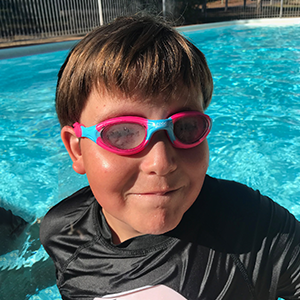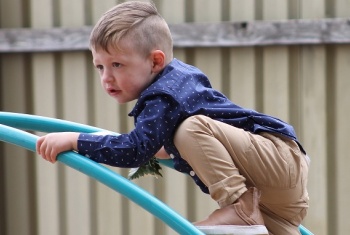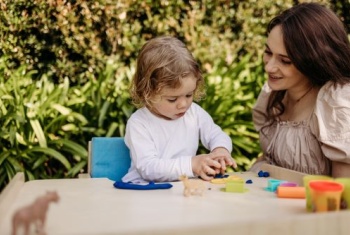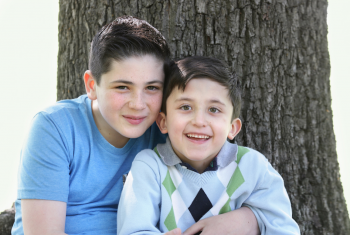At the tender age of three, Christopher’s speech was so sophisticated that people would stop his mum Dianne in the street to comment on how ‘adult-like’ the little boy spoke.
While Christopher’s parents noticed that he had some issues with anxiety and social integration, his above-average intelligence and relatively ‘normal’ development meant there was little cause for concern and his parents assumed he would simply grow out of these behaviours.
At kindergarten, they noticed that he struggled with fine motor skills like drawing and colouring and wasn’t interested in the other children, only wanting to spend time with the adults.
But it was when he started school that Christopher’s parents really knew that their beautiful little boy would have some challenges ahead of him.
“Christopher starting school was just awful for us a family,” Dianne said.
“We didn’t know what was wrong, he was just angry all the time and couldn’t play at recess or lunchtime. Here was a kid who was so intelligent but didn’t seem able to join in at school and we would have phone calls to come and pick him up because they couldn’t calm him down.”
“It was horrible dealing with that as a parent.”
Initially Christopher was diagnosed with a learning disability and his parents were told that it would just be a matter of time before he caught up. But as time went on, things weren’t getting any better.
When Christopher’s school asked him to repeat Reception, his parents took him to a psychologist who diagnosed him with high functioning autism and a secondary diagnosis of dyslexia.
“We finally got our diagnosis, and then we started thinking, ‘how are we going to cover all these bills for all the help that Christopher is going to need?’” Dianne said.
Dianne and her husband Robert then learned about the National Disability Insurance Scheme (NDIS) which had recently rolled out in their area.
“It wasn’t a hard process at all, I thought everyone was amazingly helpful. Really it was just a matter of deciding clearly what the problems were and what interventions were needed,” Dianne said.
Dianne said that, despite having a range of problems including high functioning autism spectrum disorder with associated minimal motor dysfunction, developmental coordination disorder, auditory processing disorder and dyslexia with dyspraxia, Christopher was now coming along in leaps and bounds.
“Christopher is turning into the most incredible human being, and he wouldn’t have been able to do that, or make the progress he has made if we hadn’t had the support from the NDIS,” Dianne said.
“He needs occupational therapy, speech therapy, aqua-therapy, and very explicit training in social skills. There’s a whole swathe of things we are now involved in that we wouldn’t have been able to if we had to finance it all ourselves. It would have broken our family.”
Dianne said the aqua-therapy especially had made a huge difference to Christopher’s life.
“Christopher loves the water and swimming is making a big difference to his muscle tone and strength. Now that he can swim, we can also take him to the beach and the swimming pool, and know that he’ll be safe. He could swim the length of a pool if he needed to.”
The occupational therapy and aquatherapy has had the added benefit of building Christopher’s strength and fine motor skills to a level where he could take up martial arts – a dream of many years for the super hero-mad little boy.
“He loves martial arts, and at the end of last year he got a certificate for the ‘most improved student’. The occupational therapy he has done has given him enough support to be able to control his body to do it.”
Christopher’s love of fantasy stories, super heroes, and space led to a proud moment for Dianne and Robert several weeks ago, when Christopher brought home a story he had written himself at school after only recently learning to use talk-to-text to help overcome his reading and writing problems.
“He’s always wanted to be an author. A kid on the spectrum with severe dyslexia and auditory processing – talk about having a few barriers!”
Dianne, who is a medical scientist, said that the early intervention therapies Christopher had received through the NDIS were the key to Christopher’s incredible progress - from a frustrated little boy to a thriving 10 year old who was keeping up with his peers.
“We were lucky to be able to get him that intensive early intervention. I really believe that the early intervention is the key. Identifying the problems as early as possible and getting the help to know what to do to address them,” Dianne said.
“Because we’ve done it early, he’s developed a lot of skills which means that rather than being miles behind his peers, he is within coo-ee of them which makes school a lot easier.”
“After all these years where I’ve been worried if he is going to be alright, I’m starting to see now that he will.”
Two years ago, the family was hit with a major setback when Dianne developed a serious heart condition and had to have a triple bypass requiring a lengthy hospital stay. Robert had to stop working to become the sole carer of Christopher and his younger brother Patrick.
“If we hadn’t had the NDIS funding, we would have had to give up on all of Christopher’s supports,” Dianne said.
“You never know what curve balls life will throw at you, so to be able to retain the continuity of Christopher’s therapies was wonderful.”
Dianne said she and Robert taught their boys that Christopher was no different to any other person with their own strengths, weaknesses, and problems to overcome.
“We don’t want him to think of himself as having a disability – he’s got problems just like everyone else has problems and he just has to overcome them in the best way that he can,” Dianne said.
Dianne said she wanted people to understand that the NDIS isn’t a scary or difficult thing.
“It’s a little bit of effort but that’s for the good of your children. If you’ve got a child with a disability, go get the help from the NDIS. You might be surprised at what they can do to help.”
“Christopher was this little kid who was just struggling so badly and not able to tell us what was wrong. We found out that autism didn’t have to be a scary diagnosis, there were mechanisms out there to help support us through it and help Christopher to become the person every parent wants their child to be - happy and a contributing member of society.”
"As long as we give him the skills to be able to live a happy life, that's all we can do."



